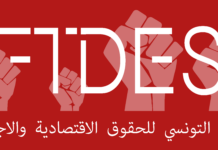The celebration of Women’s Day in Tunisia this year has shown that pride and self-satisfaction that have portrayed Tunisia as the pioneer in women’s emancipation, from the Code of Personal Status (CPS) to subsequent legislations, haven’t concealed a bleaker reality: we are still a long way from gender equality. And there are causes of alarm.
Last February, The Ministry of Women and Family Affairs published a survey about violence against women. It showed that about half of the Tunisian females, aged between 18 and 64 have been victims of violence, whether physical, psychological or sexual, at least once in their life time.
The survey added that most of this violence occurs within the household where, generally, the spouse or the partner is the perpetrator.
So far, the measures to prevent such violence remain inadequate, with flawed protective laws, total absence of awareness-raising campaigns and no protection for the victims.
As for child sexual abuse, it has known a sharp increase in the aftermath of the revolution: 262 cases in 2013, 313 in 2014 to 601 in 2015. (Highlights .com, February 4th, 2017)
The other major issue is the economic marginalization of women. A study carried out by the Association of Democratic Women (ATFD) on rural women found that the agricultural activities are more and more feminized and that rural women represent 92% of the productive capacity in agriculture, working with no social security at all. Worse still, the study showed that they work with no legal contract. (Essabeh Newspaper, 26 December 2015)
But there remains a glimmer of hope with the new draft law on the Elimination of Violence against Women, submitted to the Assembly of People’s Representatives (APR) last year, a draft law that predicts severe sanctions against “all forms of gender based violence directed by any perpetrator , whatever form it takes.” (Article 2)
Besides, the bill introduces legal protection for victims, with a widened definition of sexual harassment, including street harassment. Another major improvement: it aims to raise awareness among children and young people through programs to “show the magnitude of the issue (of violence).”
In fact, the bill is expected to avoid all the loopholes in the current laws including those that grant perpetrators of rape and sexual assault a way out: with the current flawed law, for instance, the rapist can get off scot-free if he marries his victim.
But the pending law is criticized by civil society actors as there‘s no reference to their vital role in raising awareness about the issue. In fact, Tunisian civil society organizations have carried out, through decades, huge and sustained advocacy campaigns to end both violence and discrimination against women.
Furthermore, the project law doesn’t refer to international conventions, mainly the Convention on the Elimination of All Forms of Discrimination Against Women (CEDAW). Idem for national texts: no reference to the constitution (2014) , and to article 46 that charges the state with ensuring the eradication of violence against women.
Equal Inheritance: Not a priority?
Although Tunisia has one of the most progressive personal statuses in the region, some discriminatory provisions still exist. Take for example, inheritance: women are entitled to only the half of any inheritance received by the male counterparts. For those who stick to this legislation, they think they could not change what Sharia law commends.
Last year, an independent MP proposed a law designed “to facilitate” equality in inheritance between men and women. The proposed law tried to be in line with the CEDAW convention that urges signatory governments to “incorporate the principle of equality of men and women in their legal system, abolish all discriminatory laws and adopt appropriate ones prohibiting discrimination against women” and consistent with the Tunisian constitution that stipulates that “male and female citizens are equal before the law, without discrimination.”
However, not only did the proposed law of “optional “equal share of inheritance meet resistance from religious groups and imams who consider that any equality there would “contravene explicit textual directives “of the Quran, but also from progressive elites in the parliament, who after signing with the bill withdrew their support, using the excuse of “more pressing matters and priorities”.
“This is not the time to open the debate on equality in inheritance, we have other priorities,” said Hamma Hamami, Spokesman of the Progressive Popular Front, to Radio Mosaique Fm (Inheritance Equality Deferred in Favor of “More Pressing Matters” May 6, 2016.)
In Morocco, when the National Human Rights Council published its report, equality in inheritance received significant attention and some religious scholars gave their support, believing that Islam is not only texts but “ijtihad, (“reasoning”). Islamic views should adapt to new challenges, evolutions and complexities of life, and ” Quran is the book of guidance , not the book of law,” says one enlightened scholar.
As for our progressive leftist elites in Tunisia, who are frightened of the social backlash if they stand with equal inheritance, we could only ask them to practice what they’ve been preaching: gender equality, women empowerment, respect of the constitution, international law…
Besides pioneers of women’s liberation from the Egyptian Kacem Amine, to the Tunisians Tahar Hadded and Habib Bourguiba did not just comply with existing norms, they had the courage to move the public opinion forward with new ideas; otherwise no change would have happened. “Man cannot discover new oceans if he has not the courage to lose sight of the shore,” said the French writer, André Gide. And I think he’s right.
In spite of advances in legislations, whether through the code of personal status or in the constitution, we are still far from gender equality: women still face discrimination mainly in two areas: their ability to get equal inheritance and to receive protection against all types of violence. There’s a keynote to remember, though: there’s no democratic progress, social justice or sustainable development in Tunisia without women’s empowerment.

 Français
Français العربية
العربية


